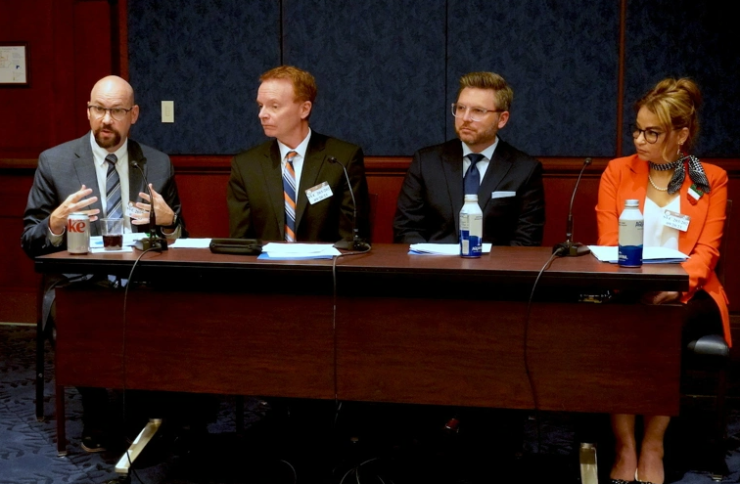
WASHINGTON — International religious freedom advocacy groups released a joint report Wednesday warning that the number of persecuted Christians being resettled into the United States from countries where they face most persecution still hovers near historic lows even as much of society has regained a sense of normalcy after the COVID-19 pandemic.
The Christian persecution watchdog organization Open Doors US teamed up with the Evangelical humanitarian agency World Relief to release the latest edition of their "Closed Doors" report. The organizations had previously published a "Closed Doors" report in 2020.
Unveiled at an event on Capitol Hill, advocates stressed that as one out of every seven Christians worldwide is subject to "high levels of persecution and discrimination," the number of Christian refugees admitted into the U.S. from the 50 countries on Open Doors' annual World Watch List remains near the lowest level in a decade.
"Recent shifts in U.S. policy reveal that America is no longer the safe haven for displaced persons that it once was," the report states.
While refugee admissions into the United States were dramatically reduced under the Trump administration and reached their lowest point during the COVID-19 pandemic, the groups warn that refugee admissions have "rebounded more slowly than the pace at which most of life in the United States has returned to a post-pandemic normal."
"By the end of fiscal year 2022, the number of Christian refugees resettled from the 50 countries where Christians face the most severe persecution was down by about 70% compared to the fiscal year 2016," World Relief Vice President of Advocacy and Policy Matt Soerens said.
While the U.S. resettled 9,538 Christian refugees from the 50 countries on the World Watch List in fiscal year 2022, that number amounts to less than one-third of the 32,248 Christian refugees admitted from such countries in fiscal year 2016, the final year of the Obama administration when nearly 85,000 refugees were admitted into the U.S.
At the same time, the number of Christian refugees admitted from countries on the World Watch List in fiscal year 2022 increased from the low of 5,390 measured in fiscal year 2020.
While the report focuses primarily on the effects of changes to U.S. refugee and asylum policy on persecuted Christians, the report notes that other minority groups have largely been shut out of the U.S. refugee resettlement system.
While Soerens expressed gratitude for the increase in resettlement and predicted statistics from the fiscal year 2023 would reveal the resettlement of more Christian refugees, he believes "the numbers are far less encouraging for Christian refugees from several particular countries where Christians face especially severe persecution."
Iran, which comes in as the eighth worst persecutor of Christians on the World Watch List, saw a 95% drop in the number of Christian refugees admitted between 2016 and 2022. Iraq ranked the 18th worst persecutor of Christians worldwide witnessed a 94% decrease in the same period.
The number of Christian refugees from Burma, also known as Myanmar, fell by 92% despite its status as the 14th worst persecutor of Christians, according to the Open Doors World Watch List.
Refugee arrivals from Eritrea, the fourth worst prosecutor of Christians, declined by 85%.
Soerens expressed concern about "several new policies and policy proposals that relate to asylum and that would restrict access to asylum for persecuted Christians and for others who might seek asylum at the U.S.-Mexico border."
The report calls out a rule instituted by the U.S. Department of Homeland Security under the Biden administration in May that restricts eligibility for asylum for those who enter the U.S. in ways other than a lawful port of entry.
"A new app designed to request asylum appointments at ports of entry, however, offers significantly fewer appointment slots than the number of individuals seeking to request asylum, creating a situation that some have described as an 'asylum lottery,'" the report notes.
Soerens described the U.S. asylum system as "a lifeline for persecuted Christians who were unsafe where they were living and whose only hope was to get to a safe place."
The panelists at the event warned about the implications of H.R. 2, also known as the Secure the Border Act of 2023.
Passed by the Republican-controlled U.S. House of Representatives in a 219-213 vote earlier this year, the measure would reform the asylum process, in part by requiring those seeking asylum at the U.S.-Mexico border to pay a $50 fee.
World Relief President and CEO Myal Greene characterized H.R. 2 as an "incredible impediment to supporting and bringing a pathway for asylum for individuals who are fleeing for religious reasons." Soerens took issue with the bill's efforts to "roll back access to asylum" and increased "documentary standards" required to qualify for asylum under the legislation, which is still awaiting action in the Democrat-controlled U.S. Senate.
Greene called on the Biden administration to "raise and increase the refugee resettlement ceiling," urging Congress to restore the Lautenberg Amendment.
Named for the late Sen. Frank Lautenberg, D-N.J., Greene praised the amendment as a "bipartisan, broad consensus piece of legislation for many years, which specifically seeks to create a pathway for people from former Soviet republics" as well as "particular religious minorities coming to this country."
Greene lamented that the amendment was not included in the most recent House Foreign Operations bill.
Soerens praised the Dignity Act as a bipartisan effort that would "put about $35 billion into border security" and "dramatically expand the adjudication capacity at the border by increasing the number of judges and officers that will … verify asylum claims." He believes the act will enable people to "go through that process closer to the border and not necessarily be distributed across the United States."
Sponsored by Rep. Maria Elvira Salazar, R-Fla., the Dignity Act has secured the support of five Republican co-sponsors and six Democrat co-sponsors in the U.S. House of Representatives. The chamber has yet to vote on the legislation.
Courtesy of The Christian Post.




